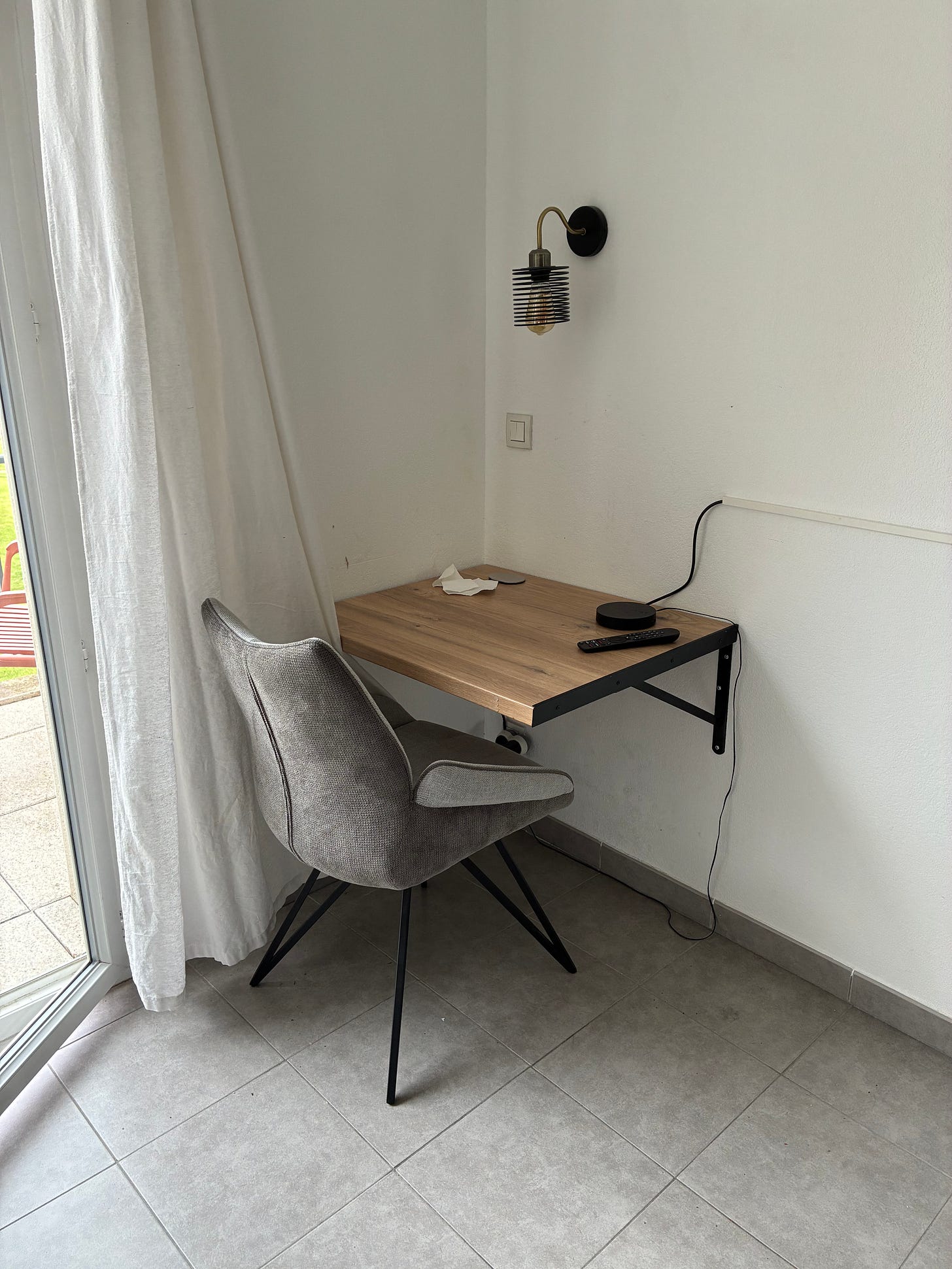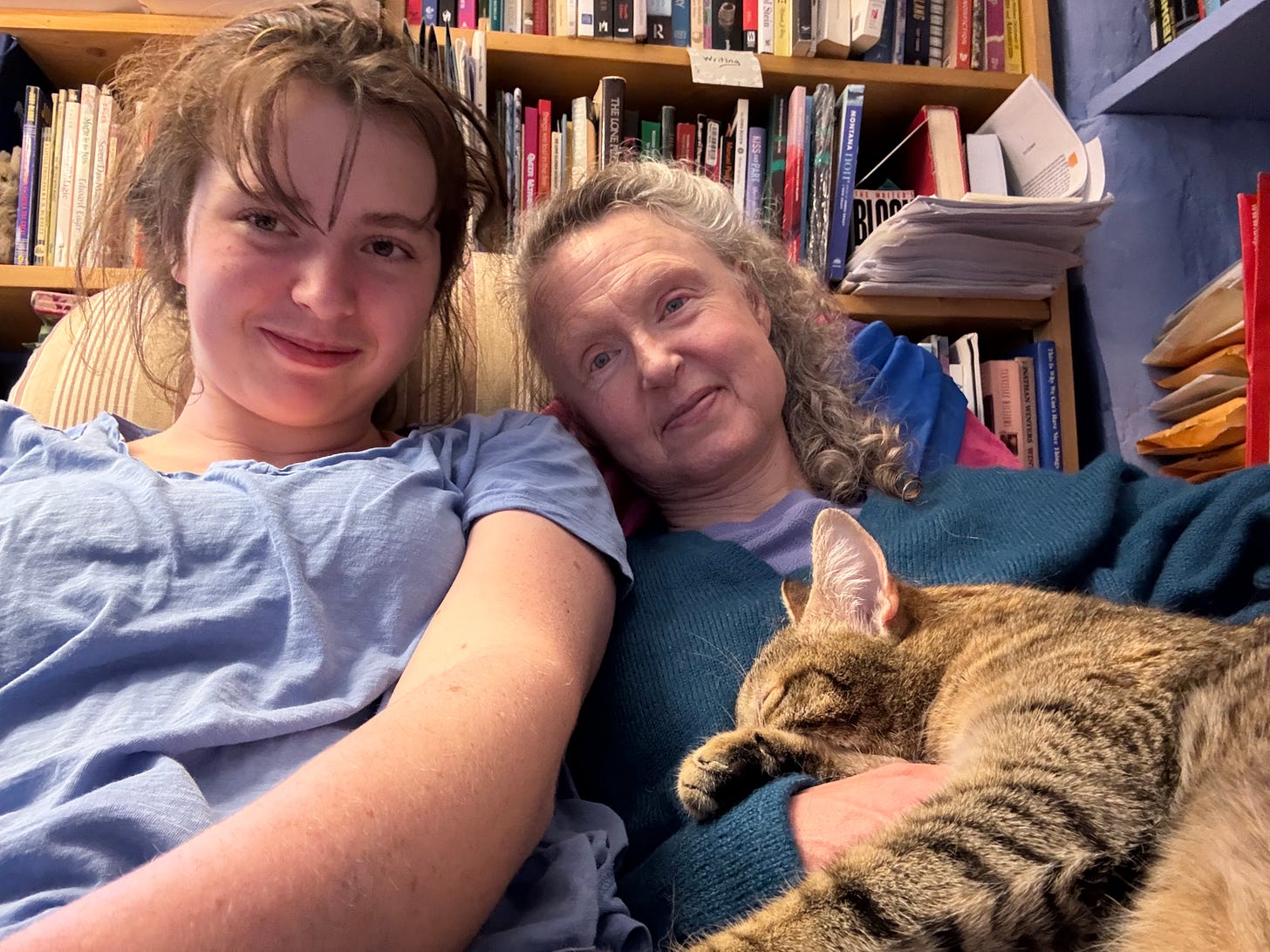Hi beautiful humans!
First, a wee bit of writing promotion: Those of you interested in reading my story “Dead-end vagina,” described as “a surprisingly humorous look at cancer” in the Bournemouth Writing Prize Anthology 2025, you can now buy the anthology here: https://www.amazon.co.uk/s?k=bournemouth+writing+prize+2025&crid=28GG9LTIKHIEL&sprefix=%2Caps%2C99&ref=nb_sb_ss_recent_1_0_recent
Now, on to the week’s news.
No matter how much I have disliked a soulless flat or cheap, cramped hotel room, I almost always feel a twinge of melancholy and nostalgia upon departure. Because it is a place where our lives have taken place, for however brief a time. Such were my thoughts on departing the flat in the Montpellier suburbs last week. Significant conversations happened in those rooms, daughters and husbands were hugged, meals were made, and a lot of one-foot exercises were done. There was also a pretty view of the golf course, although it was occasionally disrupted by the view of actual golfers, never great advertisements for the fitness value of the sport. That was mean. I retract. The golf course was also a constant reminder of the high fence around it, of our exclusion. We were not allowed to walk those beautiful greens, past the flowering trees under the blue Mediterranean sky. Those greens were reserved for those who paid greens fees.
There was a pretty river near us, where Theo took to daily swimming in its glacial waters. She even climbed a waterfall. One morning, I came with her to film her doing an ice-bucket charity challenge for Instagram, which she did standing in the middle of the river. We thought we’d have the place to ourselves, but a man stood next to us, smoking a cigarette and drinking something purple out of a water bottle. We said hello, but he stayed silent. He didn’t move away. He just stood there watching as Theo helped me down the bank and I filmed two takes of her fully dressed in the river pouring water over her head and swimming away. We couldn’t stop laughing. The man must have wondered what on earth we were doing, but he never said a word. No, “that must be cold!” or “looks like you two are having fun!” He followed us back to our building, which worried me, but he knew the code so he must live there. Strange, silent men watching my teenage daughter while drinking wine at 11 a.m. make me uneasy.
On our last morning, Tim and I watched Reading Lolita in Tehran at the popcorn-free cinema. Most of it was in Persian, with French subtitles, though there were some English bits. Watching the Iranian version of extreme patriarchy exert all of its energies into controlling, demeaning, raping, and murdering women does make one wonder if there is any hope in a world made by men. The movie skates over the surface of the women’s stories, as there wasn’t time to delve deeply into each woman’s life. It felt like an introduction to a world and life and political situation rather than a deep dive into it. The acting was beautiful, though staring at the faces of traumatized women for two hours is exhausting. I read the book my first year in Yemen, alone in my old-city house, on my mattress on the floor. I remember having the same thoughts about the men, and a similar frustration with the dearth of material on how the books the women read actually affected them and their lives. I wanted more specifics about what the women drew from literature, how it provided sustenance. But perhaps it was more about the solace of gathering with other women in extreme circumstances than about the books themselves. I have to say, if I were to teach a book in such an environment, to have to defend every aspect of it, I wouldn’t start with Lolita. Sex is already a hard sell, but pedophilia? To each reader her own tastes, though. And it makes a more scandalous title than Reading Layla Balabaaki’s I Live in Tehran. I met Nafisi once at a conference, and she was delightful and kind.
My first day at home, I was finally allowed to take off my boot, after five weeks. I am still getting used to balancing on my real feet. My foot is still in pain, and I am told it will still take ages to heal, but I can start relearning to walk. I continue my foot-free exercise routines so as not to aggravate it. I am so nervous on the stairs, creeping slowly up and down. I constantly remind myself, “NO MULTITASKING ON THE STAIRS.” No looking at my phone or the book in my hand or carrying too many cups of tea. Distractions are there to kill me.
We were only home for one day before we had to head back to Montpellier to get Theo to her dress rehearsal and then to her two performances. Before seeing the show, I read the two Marivaux (just one name, like Madonna or Cher) plays upon which it is based, La Dispute and L’Ile des Esclaves. Both rather silly plays about social experiments. It was like reading bad Molière. I struggle to understand spoken French in the theatres, but reading the plays beforehand helps.
Theo interrupted me as I was reading and came to squeeze into my reading chair with me, half on my lap. The cat came and joined us. We sat there talking for much of the afternoon, about plays and writing and she asked a question about a malicious ex of mine, which led to me allowing her to read an essay I published online that answered her question. It’s an essay I was terrified to publish, as it touches on the darkest parts of my life and character. (If you’re curious, here it is:
https://www.action-spectacle.com/summer2023/steil ) .
But I keep very few secrets from my daughter. Theo hugged me and said she was sorry about the things boys and men have done. And I said, “it’s every woman’s story. You see now why I wish you were a lesbian?”
Other reading notes:
I just finished Hemingway’s A Moveable Feast (yes, I know, I read everything decades or centuries after everyone else reads them), which I read in response to a Hemingway tour we took on my last trip to Paris with my Rosemont College MFA students. Yes, it makes me want to move to Paris (but in the 20s). It’s also essentially a gossip column about expat life in Paris in the 1920s, including the most famed characters of the Era: Ford Maddox Ford, Ezra Pound, Gertrude Stein, F. Scott Fitzgerald, and Sylvia Beach. Hemingway is scathing about many of them, while pretending to be above the fray. Had a woman written the book, it would have been dismissed as dishy and scurrilous mudslinging. Particularly the reason he gives for the end of his relationship with Stein, which is senselessly cruel. None of this makes me devalue the book; I enjoyed it immensely. And it does have plenty to say about the diligence and discipline required to make oneself a writer.
Although he was a new father at the time, he never expresses any of the overwhelm or emotion every single woman I know goes through after the birth of a child (okay, I’m not surprised given the man and the time, but it still must be noted). He and Hadley leave their young son with a housekeeper for months at a time while they travel, apparently without compunction. They always have childcare, even in their direst poverty. Having a child is never even a minor inconvenience to him. He also never mentions what Hadley does all day, while he is writing in cafés or talking with poet friends, before he finally comes back to her for dinner. I mean, that isn’t the point of the book, I know, but it seems odd not to ever refer to it. The book is kind to Hadley, however. He repeatedly says in the notes at the end that she is its heroine (I’m not sure the text justifies this, but still).
Hemingway is also highly critical of other people’s (mostly Scott’s) drinking, despite putting away an astonishing amount of alcohol at every meal. He is above reproach, apparently, because he at least waits until after he has written. And wine doesn’t count, he says, because the French consider it as important a part of a meal as the food. So he has a few aperitifs followed by three bottles of wine over lunch and considers himself a moderate man.
My favorite part, however, is when he chastises Fitzgerald for altering his stories to make them more sellable. Scott confesses that he wrote good stories, but he “changed them for submission, knowing exactly how he must make the twists that made them into salable magazine stories.” Shocked, Hemingway says this is nothing but “whoreing.” If writers wrote thinking of anything other than the craft, he said, they would destroy their talent. I am absolutely on Hemingway’s side in this argument, although it’s clear that most of the publishing world sides with Fitzgerald.
I’m willing to rewrite and edit a book or story near-infinite times if it will make it a better book or story—but not for purely commercial reasons. Well. Okay. Maybe a little for commercial reasons. It’s not like I likely have years to wait around for books to sell themselves based on the beauty of their sentences alone.
Two more—no, three!—bits of personal news before I go. First, our daughter just found out she won the Young Performer of the Year award at the Richmond Theatre Festival in London. Which means she will now be performing one of her pieces at the Normansfield Theatre in June (not sure how we’re going to afford that trip, but we’ll try). Second, her show L'île - (ou comment détruire la barbarie des cœurs) opened in Montpellier last night at the Théatre Jean Vilar! We have seen both performances, and are so proud of Theo for her work on the show and 3) on second thought, I’ll save this one for next week. It’ll keep.
Service element for those of you also injured or disabled and unable to use your feet: A few of the YouTube workouts that have been getting me through—I usually combine three or four of them a day:
16-minute no-nonsense broken foot workout with Zack Henderson:
30-minute full-body workout with Mari:
25-minute Ankle and foot-free yoga with James:
30-minute Basic Pilates mat workout for dancers that doesn’t use feet, with my favorite ballet teacher Kathryn Morgan:
No-feet yoga with Charlie Fellows (there are four of these 30-minute workouts):
30-minute mostly legs workout with Jenessa/Fitnessa:
30-minute chair cardio with Caroline Jordan. She has a million of these. Warning: I find her relentless and insipid pep talks drive me around the bend. But she does the best chair cardio workouts, so I endure:
40-minute chair cardio and strength training with Jessica Smith and her dog Peanut:
30-minute chair cardio with Paul Eugene. Paul’s workouts are usually way too easy, but I have a soft spot for him and his orange sneakers. He has lots of these, including hilarious chair dancing:
That should be enough to get you started. If you have any of your own favorite foot-free workouts, please share them with me! I am so, so bored with mine.










Thank you, Jennifer, for your beautiful writing and for generously sharing your experiences with us. You are an extraordinary mother; your bond with Theo is inspiring. It’s rare to witness such profound communication and connection between a mother and her child, and it’s something truly worth celebrating. Your journey touches our hearts.
Sorry Jennifer, unable to order a copy of the Bournemouth anthology to be delivered to France. I saw a kindle edition briefly appear on Amazon.uk and then it disappeared!! I'll try later ... after Amazon.uk thinks about it....!
Liked your blog and other links. provided.
Thanks
Sally